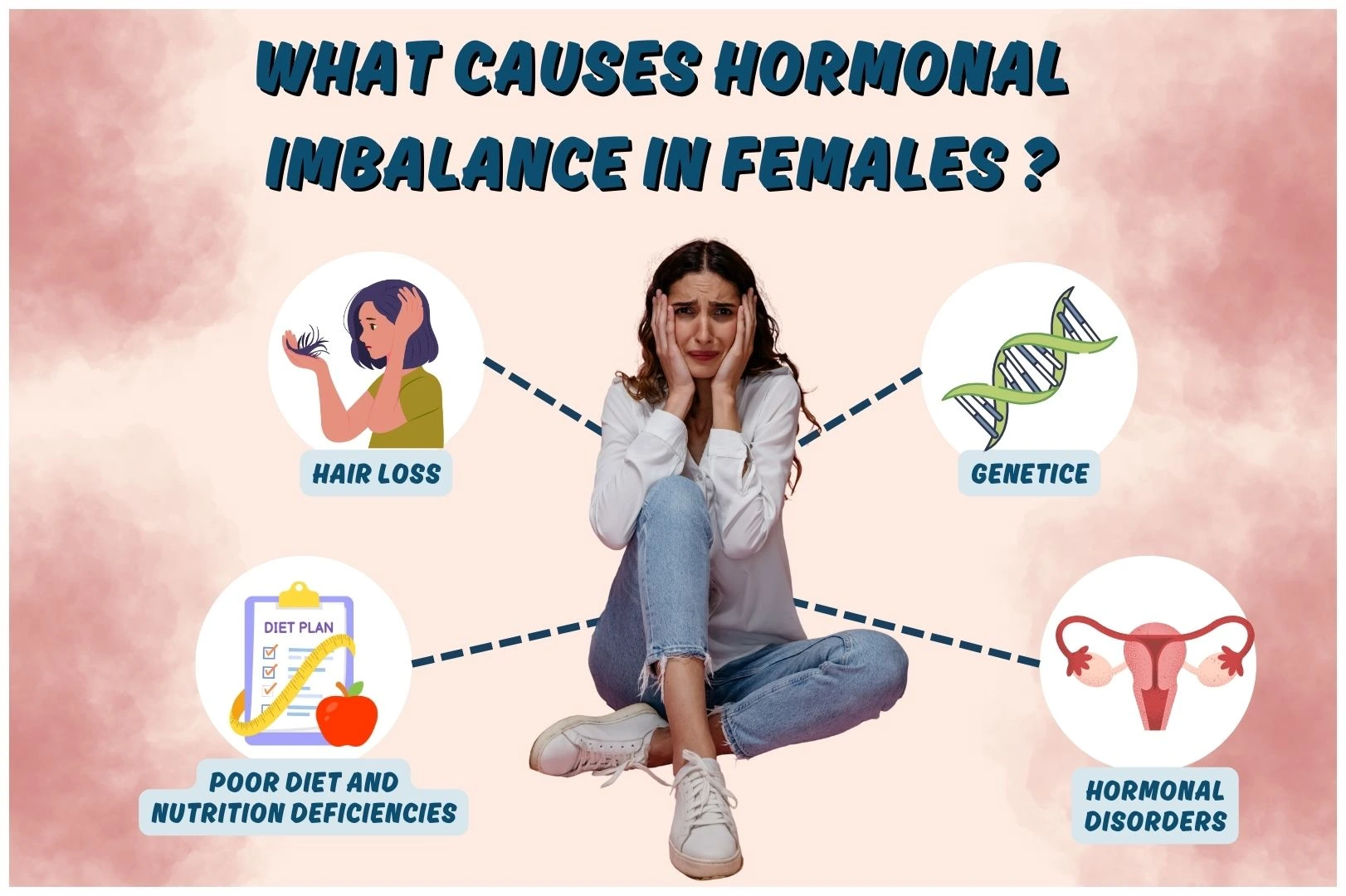What Causes Hormonal Imbalance in Females?

What Causes Hormonal Imbalance in Females?
Hormones play a vital role in maintaining women’s overall health, regulating everything from metabolism and mood to reproductive health and sleep cycles. When these chemical messengers fluctuate or become unbalanced, it can lead to a wide range of symptoms that affect both physical and emotional well-being.
Many women often ask: What causes hormonal imbalance in females? The answer is not always straightforward, as multiple factors can disrupt the delicate balance of the endocrine system.
In this blog, we’ll explore the causes of hormonal imbalance in women, clear up common misconceptions (like whether female masturbation causes hormonal imbalance), and understand how hormone-related issues can lead to problems such as irregular periods and even infertility.
You must read this – Hormonal Imbalance: Causes, Symptoms & Natural Remedies
Understanding Hormonal Imbalance
Hormonal imbalance occurs when there is too much or too little of one or more hormones in the bloodstream. In women, the most commonly affected hormones include estrogen, progesterone, cortisol, thyroid hormones, and insulin. Even a slight disruption can impact menstrual cycles, mood, fertility, skin health, metabolism, and energy levels.
While mild fluctuations in hormones are natural during puberty, pregnancy, or menopause, chronic or severe imbalance often signals an underlying health condition or lifestyle issue.
Major Causes of Hormonal Imbalance in Females
Now let’s dive into the most common causes of hormonal imbalance in females, spanning from medical conditions to lifestyle factors.
1. Polycystic Ovary Syndrome (PCOS)
PCOS is one of the leading causes of hormonal imbalance in women. It occurs when the ovaries produce excessive androgens (male hormones), leading to irregular ovulation. Symptoms include weight gain, acne, excessive hair growth, irregular menstrual cycles, and difficulty conceiving.
2. Thyroid Disorders
Both hypothyroidism (underactive thyroid) and hyperthyroidism (overactive thyroid) disrupt hormonal regulation. These conditions affect metabolism, energy, mood, and menstrual cycles.
3. Stress and Cortisol Levels
Chronic stress forces the adrenal glands to release high amounts of cortisol. Elevated cortisol interferes with the production of sex hormones like estrogen and progesterone, creating an imbalance.
4. Poor Diet and Nutrition Deficiencies
High sugar intake, processed foods, alcohol, and caffeine can destabilize insulin and other hormones. Deficiencies in nutrients like vitamin D, B vitamins, magnesium, and omega-3 fatty acids also contribute to hormonal imbalance.
5. Lack of Physical Activity or Excessive Exercise
Both extremes, being sedentary or over-exercising, can disrupt hormone levels. Intense workouts can lower estrogen and progesterone, while a lack of movement contributes to insulin resistance and weight gain, fueling imbalance.
6. Pregnancy, Postpartum, and Menopause
Life stages naturally trigger hormonal fluctuations. Pregnancy increases estrogen and progesterone, while postpartum shifts can cause mood changes. Menopause is marked by a significant decline in estrogen and progesterone, often leading to hot flashes, mood swings, and irregular cycles.
7. Birth Control and Hormonal Medications
Oral contraceptives and other hormonal treatments may regulate cycles temporarily, but can sometimes cause imbalances when discontinued.
8. Environmental Toxins and Endocrine Disruptors
Exposure to pesticides, plastics (BPA), and chemicals in cosmetics or cleaning products can mimic or interfere with natural hormone functions.
9. Obesity and Insulin Resistance
Excess body fat disrupts estrogen and insulin balance, increasing the risk of PCOS, infertility, and type 2 diabetes.
10. Sleep Disorders
Poor or irregular sleep alters melatonin and cortisol levels, which indirectly affect reproductive hormones.
What Causes Hormonal Imbalance in Females at Different Ages?
Hormonal imbalance can appear differently depending on age and life stage:
- Teenagers – Commonly due to puberty, stress, eating disorders, or PCOS.
- 20s and 30s – Often related to stress, contraceptives, or conditions like thyroid disorders and PCOS.
- 40s and 50s – Frequently linked to perimenopause and menopause, along with lifestyle factors and chronic health conditions.
Understanding what causes hormonal imbalance in females across these stages helps in taking preventive and corrective measures.
Addressing a Common Myth
Does Female Masturbation Cause Hormonal Imbalance?
The answer is No. Female masturbation is a natural sexual activity that does not disrupt hormone levels. In fact, it may temporarily release feel-good hormones like dopamine and oxytocin, which help reduce stress and improve mood. However, excessive reliance on any activity for emotional regulation may affect mental well-being, but it does not biologically cause a hormonal imbalance.
Can Hormonal Imbalance Cause Irregular Periods?
Yes, absolutely. One of the most common signs of hormonal imbalance in women is irregular menstruation.
When estrogen and progesterone levels fluctuate abnormally, they affect the timing, flow, and length of periods. Conditions like PCOS, thyroid disorders, and stress are major contributors. Symptoms may include:
- Skipping periods frequently
- Heavy or prolonged bleeding
- Spotting between cycles
- Painful periods
Thus, if you’ve been wondering, can a hormonal imbalance cause irregular periods? The answer is a definite yes. It is often the first red flag that signals further investigation is needed.
Does Hormonal Imbalance Cause Infertility?
The reality is that hormonal imbalance is one of the leading causes of infertility in women. Hormones regulate ovulation, and any disruption in estrogen, progesterone, luteinizing hormone (LH), or follicle-stimulating hormone (FSH) can prevent the release of mature eggs.
Conditions such as PCOS, thyroid issues, obesity, and insulin resistance are directly linked to infertility due to their role in disrupting hormone levels. Treatment often involves lifestyle changes, medication, or fertility therapies to restore balance.
Symptoms That Suggest Hormonal Imbalance in Women
Alongside irregular periods and infertility, women may experience a range of other symptoms:
- Unexplained weight gain or loss
- Fatigue and low energy
- Mood swings, anxiety, or depression
- Hair loss or excessive hair growth
- Sleep problems
- Hot flashes or night sweats
- Low libido
- Skin issues like acne or dryness
Recognizing these signs early can help in seeking treatment and restoring balance.
How to Prevent and Manage Hormonal Imbalance
While some causes are unavoidable (like menopause), many cases of hormonal imbalance can be prevented or improved with lifestyle changes:
- Eat a balanced diet – Focus on whole foods, fiber, healthy fats, and lean protein.
- Exercise regularly – Moderate activity helps regulate insulin and cortisol.
- Prioritize sleep – Aim for 7–8 hours of quality sleep.
- Manage stress – Meditation, yoga, or breathing exercises lower cortisol.
- Avoid toxins – Reduce exposure to endocrine disruptors.
- Seek medical advice – For persistent symptoms, consult a gynecologist or endocrinologist.
Try Out Natural Remedy – Nari Urja: Ayurvedic Syrup for Hormonal Imbalance
Final Thoughts
Understanding the causes of hormonal imbalance in females is crucial for managing women’s health effectively. From conditions like PCOS and thyroid disorders to lifestyle factors like stress, diet, and sleep, multiple triggers can disrupt hormones.
Related Products
Nari Urja pack of 3: Ayurvedic Syrup for Hormonal Imbalance & Irregular Period
Unifemo Capsules: Menstrual Cramps & Irregular Periods
Luco Prakash: Best Ayurvedic Medicine For Leucorrhea
Earn 13.00 Reward PointsFrequently Asked Questions
Hormonal imbalance in women can be caused by PCOS, thyroid disorders, stress, poor diet, obesity, lack of sleep, pregnancy, menopause, or exposure to environmental toxins.
Common symptoms include irregular periods, weight gain, fatigue, mood swings, hair loss, acne, hot flashes, low libido, and sleep issues.
Yes. Hormones regulate ovulation, and imbalances in estrogen, progesterone, FSH, or LH can disrupt egg release, leading to infertility.
Hormonal changes can occur at any age: during puberty (teens), reproductive years (20s–30s), and perimenopause/menopause (40s–50s).
Adopt a healthy diet, exercise regularly, manage stress, get quality sleep, avoid toxins, and consult a doctor or try Ayurvedic remedies like Nari Urja Syrup for support.














